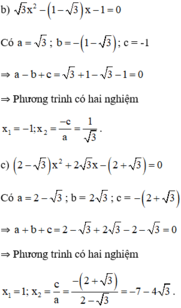Hãy nhập câu hỏi của bạn vào đây, nếu là tài khoản VIP, bạn sẽ được ưu tiên trả lời.

a) 3 x 2 − 7 x − 10 ⋅ 2 x 2 + ( 1 − 5 ) x + 5 − 3 = 0

+ Giải (1):
3 x 2 – 7 x – 10 = 0
Có a = 3; b = -7; c = -10
⇒ a – b + c = 0
⇒ (1) có hai nghiệm x 1 = - 1 v à x 2 = - c / a = 10 / 3 .
+ Giải (2):
2 x 2 + ( 1 - √ 5 ) x + √ 5 - 3 = 0
Có a = 2; b = 1 - √5; c = √5 - 3
⇒ a + b + c = 0
⇒ (2) có hai nghiệm:

Vậy phương trình có tập nghiệm 
b)
x 3 + 3 x 2 - 2 x - 6 = 0 ⇔ x 3 + 3 x 2 - ( 2 x + 6 ) = 0 ⇔ x 2 ( x + 3 ) - 2 ( x + 3 ) = 0 ⇔ x 2 - 2 ( x + 3 ) = 0

+ Giải (1): x 2 – 2 = 0 ⇔ x 2 = 2 ⇔ x = √2 hoặc x = -√2.
+ Giải (2): x + 3 = 0 ⇔ x = -3.
Vậy phương trình có tập nghiệm S = {-3; -√2; √2}
c)
x 2 − 1 ( 0 , 6 x + 1 ) = 0 , 6 x 2 + x ⇔ x 2 − 1 ( 0 , 6 x + 1 ) = x ⋅ ( 0 , 6 x + 1 ) ⇔ x 2 − 1 ( 0 , 6 x + 1 ) − x ( 0 , 6 x + 1 ) = 0 ⇔ ( 0 , 6 x + 1 ) x 2 − 1 − x = 0

+ Giải (1): 0,6x + 1 = 0 ⇔ 
+ Giải (2):
x 2 – x – 1 = 0
Có a = 1; b = -1; c = -1
⇒ Δ = ( - 1 ) 2 – 4 . 1 . ( - 1 ) = 5 > 0
⇒ (2) có hai nghiệm 
Vậy phương trình có tập nghiệm 
d)
x 2 + 2 x − 5 2 = x 2 − x + 5 2 ⇔ x 2 + 2 x − 5 2 − x 2 − x + 5 2 = 0 ⇔ x 2 + 2 x − 5 − x 2 − x + 5 ⋅ x 2 + 2 x − 5 + x 2 − x + 5 = 0 ⇔ ( 3 x − 10 ) 2 x 2 + x = 0
⇔ (3x-10).x.(2x+1)=0


+ Giải (1): 3x – 10 = 0 ⇔ 
+ Giải (2):


bn đặt tính chia đa thức, tìm ra số dư rồi cho số dư = 0 là tìm được m

Bài 1 :
Để phương trình có 2 nghiệm x1 , x2
\(\Rightarrow\Delta'=\left(-1\right)^2-\left(2m-1\right)\ge0\)
\(\Rightarrow m\le1\)
\(\Rightarrow\) Khi đó phương trình có 2 nghiệm x1 , x2 thỏa mãn
\(\hept{\begin{cases}x_1+x_2=2\\x_1x_2=2m-1\end{cases}}\)
Mà \(3x_1+2x_2=1\Rightarrow x_1+2\left(x_1+x_2\right)=1\Rightarrow x_1+2.2=1\Rightarrow x_1=-3\)
Vì \(x_1=-3\) là 1 nghiệm của phương trình
\(\Rightarrow\left(-3\right)^2-2\left(-3\right)+2m-1=0\Rightarrow m=-7\)
Bài 2 :
\(ĐKXĐ:x\ne\pm4\)
Ta có :
\(\frac{2x-1}{x+4}-\frac{3x-1}{4-x}=5+\frac{96}{x^2-16}\)
\(\Rightarrow\frac{2x-1}{x+4}+\frac{3x-1}{x-4}=5+\frac{96}{\left(x-4\right)\left(x+4\right)}\)
\(\Rightarrow\frac{2x-1}{x+4}\left(x+4\right)\left(x-4\right)+\frac{96}{\left(x-4\right)\left(x+4\right)}\left(x+4\right)\left(x-4\right)\)
\(\Rightarrow\left(2x-1\right)\left(x-4\right)+\left(3x-1\right)\left(x+4\right)=5\left(x+4\right)\left(x-4\right)+96\)
\(\Rightarrow5x^2+2x=5x^2+16\)
\(\Rightarrow2x=16\)
\(\Rightarrow x=8\)

a) 1 , 5 x 2 – 1 , 6 x + 0 , 1 = 0
Có a = 1,5; b = -1,6; c = 0,1
⇒ a + b + c = 1,5 – 1,6 + 0,1 = 0
⇒ Phương trình có hai nghiệm x 1 = 1 ; x 2 = c / a = 1 / 15 .

d) ( m – 1 ) x 2 – ( 2 m + 3 ) x + m + 4 = 0
Có a = m – 1 ; b = - (2m + 3) ; c = m + 4
⇒ a + b + c = (m – 1) – (2m + 3) + m + 4 = m -1 – 2m – 3 + m + 4 = 0
⇒ Phương trình có hai nghiệm 

bạn đăng tách ra cho mn giúp nhé
a, Để pt có 2 nghiệm pb
\(\Delta'=1-m\ge0\Leftrightarrow m\le1\)
Theo Vi et \(\left\{{}\begin{matrix}x_1+x_2=-2\left(1\right)\\x_1x_2=m\left(2\right)\end{matrix}\right.\)
\(x_1-3x_2=0\)(3)
Từ (1) ; (3) ta có hệ \(\left\{{}\begin{matrix}x_1+x_2=-2\\x_1-3x_2=0\end{matrix}\right.\Leftrightarrow\left\{{}\begin{matrix}4x_1=-2\\x_2=-2-x_1\end{matrix}\right.\Leftrightarrow\left\{{}\begin{matrix}x_1=-\dfrac{1}{2}\\x_2=-\dfrac{3}{2}\end{matrix}\right.\)
Thay vào (2) ta được \(m=\left(-\dfrac{1}{2}\right)\left(-\dfrac{3}{2}\right)=\dfrac{3}{4}\)
\(b,\Delta=\left(m+5\right)^2-4\left(-m+6\right)\ge0\Leftrightarrow\left[{}\begin{matrix}m\le-7-4\sqrt{3}\\m\ge-7+4\sqrt{3}\end{matrix}\right.\)
\(\Rightarrow\left\{{}\begin{matrix}x1+x2=m+5\\2x1+3x2=13\end{matrix}\right.\Leftrightarrow\left\{{}\begin{matrix}2x1+2x2=2m+10\\2x1+3x2=13\end{matrix}\right.\)\(\)
\(\Rightarrow x2=13-2m-10=3-2m\Rightarrow x1=m+5-x2=m+5-3+2m=3m+2\)
\(x1x2=6-m\Rightarrow\left(3-2m\right)\left(3m+2\right)=6-m\Leftrightarrow\left[{}\begin{matrix}m=0\left(tm\right)\\m=1\left(tm\right)\end{matrix}\right.\)
\(c,\Delta'=\left(m+1\right)^2-\left(m^2-2m+29\right)\ge0\Leftrightarrow m\ge7\)
\(\Rightarrow\left\{{}\begin{matrix}x1+x2=2m+2\\x1=2x2\end{matrix}\right.\Leftrightarrow\left\{{}\begin{matrix}x2=\dfrac{2m+2}{3}\\x1=\dfrac{2\left(2m+2\right)}{3}\end{matrix}\right.\)
\(\Rightarrow x1.x2=\dfrac{\left(2m+2\right).2\left(2m+2\right)}{9}=m^2-2m+29\Leftrightarrow\left[{}\begin{matrix}m=11\left(tm\right)\\m=23\left(tm\right)\end{matrix}\right.\)

\(f\left(x\right)=6x^3-7x^2-16x+m\)
Do \(f\left(x\right)\) chia hết \(2x-5\), theo định lý Bezout:
\(f\left(\dfrac{5}{2}\right)=0\Rightarrow6.\left(\dfrac{5}{2}\right)^3-7.\left(\dfrac{5}{2}\right)^2-16.\left(\dfrac{5}{2}\right)+m=0\)
\(\Rightarrow m=-10\)
Khi đó \(f\left(x\right)=6x^3-7x^2-16x-10\)
Số dư phép chia cho \(3x-2\):
\(f\left(\dfrac{2}{3}\right)=6.\left(\dfrac{2}{3}\right)^3-7.\left(\dfrac{2}{3}\right)^2-16.\left(\dfrac{2}{3}\right)-10=-22\)
Do chia hết , theo định lý Bezout:
Khi đó
Số dư phép chia cho :

a) (*) m = 0 => x = \(\dfrac{7}{8}\) (loại)
(*) \(m\ne0\) Phương trình có nghiệm
\(\Delta=\left[2\left(m-4\right)\right]^2-4m\left(m+7\right)=-60m+64\ge0\Leftrightarrow m\le\dfrac{16}{15}\)
Hệ thức Viet kết hợp 4x1 + 3x2 = 1
\(\Leftrightarrow\left\{{}\begin{matrix}x_1x_2=\dfrac{m+7}{m}\\x_1+x_2=\dfrac{8-2m}{m}\\x_1=2x_2\end{matrix}\right.\)\(\Leftrightarrow\left\{{}\begin{matrix}x_1x_2=\dfrac{m+7}{m}\\x_1=\dfrac{16-4m}{3m}\\x_2=\dfrac{8-2m}{3m}\end{matrix}\right.\)
\(\Leftrightarrow\dfrac{16-4m}{3m}.\dfrac{8-2m}{3m}=\dfrac{m+7}{m}\)
\(\Leftrightarrow2\left(8-2m\right)^2=9m\left(m+7\right)\)
\(\Leftrightarrow8m^2-64m+128=9m^2+63m\)
\(\Leftrightarrow m^2+127m-128=0\Leftrightarrow\left[{}\begin{matrix}m=1\\m=128\left(\text{loại}\right)\end{matrix}\right.\)<=> m = 1
Mk năm nay lên lớp 9 nên chỉ làm bài 1 đc thôi
Câu 1:
a)\(\left(2x+3\right)^2-\left(x+1\right)^2=0\)
\(\left(2x+3+x+1\right)\left(2x+3-x-1\right)=0\)
\(\left(3x+4\right)\left(x+2\right)=0\)
\(\Rightarrow\orbr{\begin{cases}3x+4=0\\x+2=0\end{cases}\Rightarrow}\orbr{\begin{cases}x=-\frac{4}{3}\\x=-2\end{cases}}\)
b)\(x^2-6x+5=0\)
\(x^2-5x-x+5=0\)
\(\left(x-5\right)\left(x+1\right)=0\)
\(\Rightarrow\orbr{\begin{cases}x-5=0\\x+1=0\end{cases}\Rightarrow}\orbr{\begin{cases}x=5\\x=-1\end{cases}}\)
c)\(3x^2-5x+2=0\)
\(3x^2-3x-2x+2=0\)
\(\left(3x-2\right)\left(x-1\right)=0\)
\(\Rightarrow\orbr{\begin{cases}3x-2=0\\x-1=0\end{cases}\Rightarrow}\orbr{\begin{cases}x=\frac{2}{3}\\x=1\end{cases}}\)